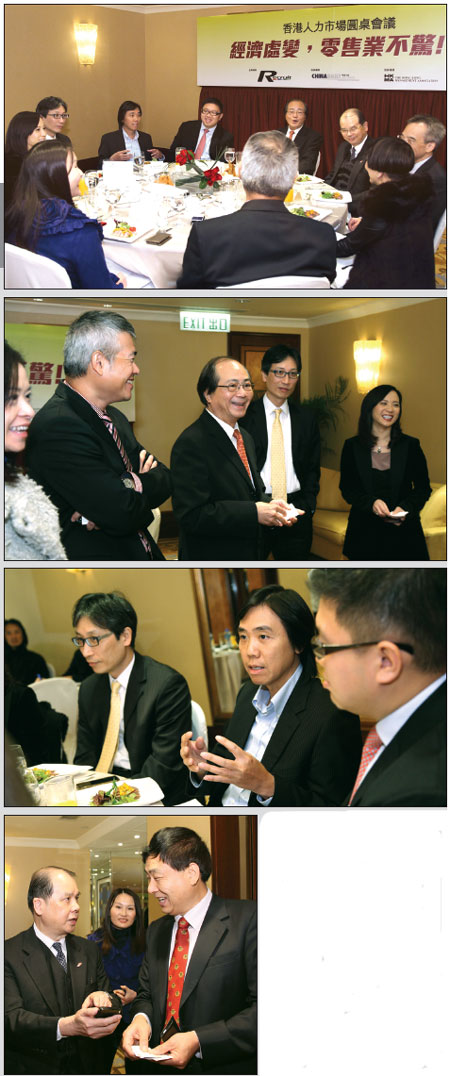Roundtable - Lack of hands
Updated: 2011-12-16 08:16
By Joy Li(China Daily)
|
|||||||
|
Distinguished guests share thoughts during the meeting. Edmond Tang / China Daily |
While Hong Kong retailers feel excited about shoppers, both local and visitors, queuing to pay at the cashiers, they expect to see the same enthusiastic response to their hiring calls. The city is enjoying a retail boom, thanks to a vibrant domestic economy and the individual travel scheme, yet growth may be choked out due to lack of employees, a persistent plague hovering over the retail sector. To break this bottleneck and enable long-term prosperity, government initiatives are necessary to steer the workforce, as well as employer efforts to attract and retain talent, said panelists attending the roundtable luncheon.
"Right now, there is an absolute shortage in the workforce for retail. Hong Kong is faced with a structural mismatch of workforce and this phenomenon will last at least for the next few years," said Caroline Mak, regional director in North Asia for Dairy Farm and chairwoman of the Hong Kong Retail Management Association.
Mak explained that after the launch of the minimum wage, a vacuum has been taking shape in the retail job market. Those with some skills are "lifted up" to fill vacancies such as security, cleaning, and sales, rather than remaining in basic jobs such as loading warehouses and delivery.
Lancy Chui, managing director of Manpower Hong Kong, Macao and Vietnam, said that hiring demand from local retailers is huge but it may take a few months to find a cashier.
Mak added that some retailers are reluctant to open more shops because of the high marginal costs related to human resources and rent.
"They prefer to keep the status quo rather than expand. I think this is not good for the Hong Kong economy in the long run," said Mak.
Daniel Chong, managing director of YATA Department Store, said that out of the 3.6 million workforce in Hong Kong, some of them are not willing to work due to a lack of inspiration while others cannot work because of lengthy and costly transportation or other duties like taking care of children.
"To address the problem of the absolute shortage in labor, it is vital to free up more workforce, especially women," said Chong.
Ricky Ng, general manager at TSL Jewellery (HK) Co Limited, noted that Tin Shui Wai, a community where many residents are new immigrants from the mainland, has "trapped" some of the workforce that cannot be released into the job market.
"Many women hope to find jobs but the transportation costs are too prohibitive, meanwhile, they need to tender to the elderly and the kids," said Ng.
Secretary for Labour and Welfare Matthew Cheung Kin-chung said that freeing up the workforce in Hong Kong is on top of the government's policy agenda and the government has been rolling out various schemes to address this concern.
"Women are vital to the development of the retail industry. At the policy level, we need to constantly develop social support schemes," said Cheung.
In October 2008, the Social and Welfare Department launched a three-year Neighborhood Support Child Care Project (NSCCP) on a pilot basis. The project aims to provide needy families with more flexible child care service in addition to regular services and to foster, at the same time, mutual help and care in the community, according to Cheung. The NSCCP services include home-based care service for children aged under six and center-based care groups for children aged between three and under six. Service operators recruit and train carers in the neighborhood to take care of children at the carers' homes or in the service centers run by the operators.
According to government statistics, by the end of 2010, the project covered 10, 616 children, many of whom are from low-income families or new immigrant families.
The government has decided to normalize the scheme and extend its service coverage from 11 districts to all 18 districts so as to benefit more families, according to Cheung.
Another scheme aiming at diverting the workforce is the Work Incentive Transport Scheme (WITS). Since the scheme became effective on October 1 , the Labour Department received a total of 14,411 applications in the first month. WITS, which is a replacement of the previous Transport Support Scheme, allows greater flexibility by identifying families rather than individuals as an application unit, according to Cheung.
Cheung said that the government will closely monitor the implementation of the WITS scheme and carry out a mid-term review with regard to the experience gained during the first year of operation.
Cheung said he hopes the scheme will be regular rather than temporary.
At the same time, besides releasing more workforce, how to motivate youth to enter the retail industry matters a lot for its long-term health.
Mak from Hong Kong Retail Management Association said that for young people, their motivation comes from seeing a career path rather than merely taking up a job.
"Retail is not just sales. It contains a lot of specialized knowledge, such as inventory management, information system, marketing, and customer relationship management, etc." said Mak.
Mak said she expected Qualification Framework (QF) for retail to come up as soon as possible. The QF is a hierarchy that orders and supports qualifications of academic, vocational and continuing education under the Education Bureau.
Professor Raymond So Wai Man, dean of School of Business at Hang Seng Management College, said that nowadays many young people understand that education is essential for them to move up the social ladder. However, their expectations are too high, meaning they shun away from entry-level jobs.
Lancy Chui from Manpower said that to retain talent, employers should also put resources and do "employer branding," such as various training programs and team building activities.
"These engaging methods will help employees absorb knowledge more quickly and strengthen their loyalty," said Chui.
China Daily
(HK Edition 12/16/2011 page5)
